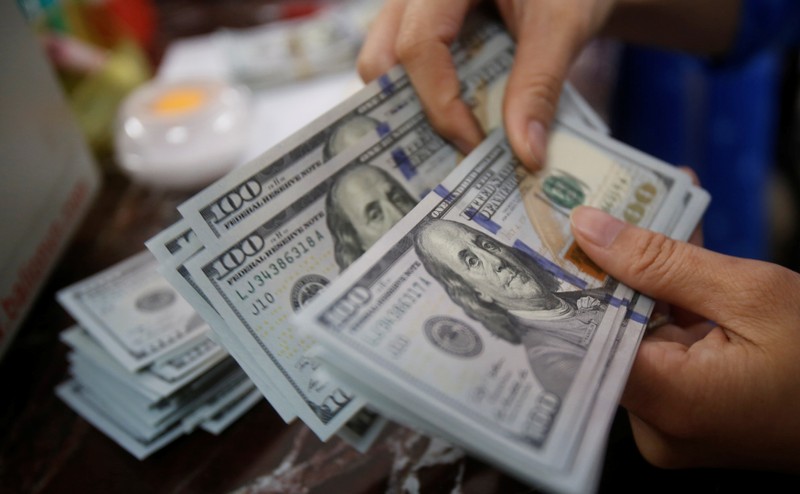
FILE PHOTO: An employee of a bank counts US dollar notes at a branch in Hanoi, Vietnam May 16, 2016. REUTERS/Kham/File Photo
May 17, 2019
By Shinichi Saoshiro
TOKYO (Reuters) – The dollar held near a two-week high against its peers on Friday, supported by strong U.S. economic data and a bounce in Treasury yields.
The dollar index versus a basket of six major currencies stood little changed at 97.802 after reaching 97.882 on Thursday, its highest since May 3.
The greenback reached the two-week peak on robust U.S. housing data and a weekly jobless claims report which pointed to sustained labor market strength in the world’s biggest economy.
The U.S. currency also drew strength as its counterparts such as the euro and pound were dogged by bearish factors.
“The euro is weighed down as the (euro) zone is saddled with weak economic fundamentals and Italian political concerns, while it’s all about Brexit for the pound,” said Junichi Ishikawa, senior FX strategist at IG Securities in Tokyo.
Italy’s right-wing League party will “tear apart” European Union rules which are “strangling” the country if it scores well in a May 23-26 European parliamentary election, Italian Deputy Prime Minister Matteo Salvini said on Thursday.
Salvini’s challenge to EU fiscal rules has been a key source of the worry for the euro, which has fallen 0.5% this week.
The safe-haven yen also stood to benefit from the woes in Europe and elsewhere.
“Fiscal risks related to Italy is a theme sure to captivate speculative market players. Any resulting ‘risk off’ could benefit the yen not only against the euro, but against the dollar as well,” said Yukio Ishizuki, senior currency strategist at Daiwa Securities.
The euro was steady at $1.1178 after falling to $1.1166 overnight, its lowest since May 6.
The common currency was a touch lower at 122.67 yen. It has retreated 0.5% against the yen this week, during which it slid to 122.06, the lowest since early January.
Britain faces a potentially disorderly exit from the European Union as Prime Minister Theresa May has struggled to keep her Brexit deal and her premiership.
The possibility of a chaotic departure from the EU pushed the pound to a three-month trough of $1.2783 on Friday. Sterling last traded at $1.2787, having slumped 1.6% this week.
The dollar initially extended overnight gains and popped above 110.00 yen. But it lost some traction, last trading at 109.735 yen, weighed down as U.S.-China trade concerns continued to bubble in the background.
China may have no interest in continuing trade negotiations with the United States now, Bloomberg reported on Friday, quoting state media outlets.
Against the safe-haven yen the greenback fell to a 3-1/2-month low of 109.020 at the start of the week when a trade war between the United States and China intensified.
China’s yuan retreated to 6.9099 per dollar in onshore trade, its weakest since late December.
The Australian dollar stretched overnight losses and fell to a new 4-1/2-month trough of $0.6883. The Aussie suffered big losses the previous day after soft domestic employment data heightened expectations for an interest rate cut by the Reserve Bank of Australia.
Elsewhere, the Turkish lira slipped 0.37% to 6.0700 per dollar after the United States on Thursday terminated Turkey’s preferential trade treatment that allowed some exports to enter the country duty free. Softening the blow slightly, Washington halved its tariffs on Turkish steel imports to 25% from 50%.
The 10-year U.S. Treasury note yielded 2.387%, having pulled back from a near two-month low of 2.354% brushed the previous day.
(Editing by Simon Cameron-Moore and Jacqueline Wong)

